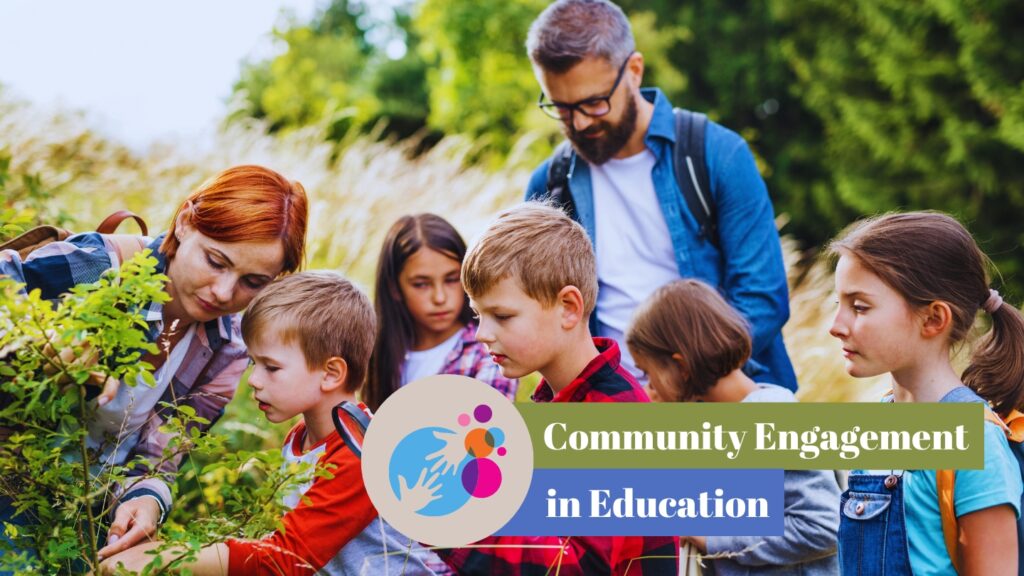Dr. Justin Blasko Discusses the Power of Community Engagement in Education
This post was last updated on November 27th, 2024

Community engagement in education signifies the collaboration between schools and their broader communities, encompassing parents, local businesses, and other organizations. These partnerships are crucial for developing education systems that address students’ unique needs while fostering a sense of belonging and involvement.
Dr. Justin Blasko, a dedicated educational leader, has invested his career in championing the power of community engagement in education. In his various leadership roles ranging from an elementary school principal to Superintendent, Assistant Superintendent, and HR Executive Director, Dr. Blasko has seen first-hand how active community involvement can transform educational experiences.
Academic Success and Community Engagement
One of the real benefits of community engagement in education is its direct effect on academic success. Research has consistently shown that students are more likely to achieve academically when communities and schools form effective partnerships. This outcome is due, in part, to the sense of shared responsibility fostered within these partnerships.
“Effective community engagement in education is a powerful catalyst for academic success,” says Justin Blasko. “When schools and communities come together in meaningful partnerships, we witness the transformative impact of shared responsibility on the achievement and growth of our students.”
For example, parents actively engaged in their children’s school communities often better understand the curriculum and educational strategies, thus enabling them to support their child’s learning at home more effectively. Community organizations and businesses can also contribute by offering resources such as after-school programs, mentorships, or internships, providing hands-on learning experiences, and reinforcing classroom learning.
Personal Development Through Community Engagement
Community engagement in education also significantly impacts students’ personal development. Active engagement fosters critical life skills such as communication, collaboration, problem-solving, and leadership. By interacting with various people in their community, students gain diverse perspectives and learn to appreciate the power of collective effort.
“By interacting with a variety of people in their community, students gain diverse perspectives and learn to appreciate the power of collective effort,” Dr. Blasko says. “As educational leaders, it is our responsibility to create opportunities for students to engage with their community, to bridge the gap between classroom learning and real-world experiences, and to empower them to become active contributors and leaders in society.”
Students who are engaged in their communities are more likely to develop a sense of social responsibility. Through volunteer work, community projects, or service learning, students can contribute to their local community’s betterment. This sense of social responsibility not only fosters citizenship but also instills values of empathy and respect for others. Dr. Blasko’s experience has taught him that when students engage in acts of volunteerism, participate in community projects, or actively participate in service learning opportunities, they not only contribute to the betterment of their local community but also cultivate values of empathy and respect for others, leading to the development of well-rounded and compassionate individuals.
Community Growth and Prosperity
The power of community engagement in education extends beyond the confines of the school. When communities are actively engaged in their local schools, they can positively impact the overall health, prosperity, and cohesiveness of the community at large.
Educational institutions, in essence, serve as a hub around which community activities and initiatives can revolve. Schools often host community events, workshops, and other activities that facilitate community engagement and participation. These interactions promote strong community identity and cohesion, contributing to an increased sense of belonging among community members.
“Getting involved in the community through education not only helps students, but it also boosts the local economy,” Dr. Blasko reminds us. “By partnering with local businesses and creating internships, we’re building a skilled workforce that fuels growth and prosperity in our own backyard.”
Community engagement in education encourages local economic development. For example, partnerships with local businesses can lead to internship opportunities for students, cultivating a skilled workforce that can contribute to the local economy. This symbiotic relationship between schools and communities can create a virtuous cycle of growth and prosperity.
Creating an Engaged Community
Despite the clear benefits of community engagement in education, fostering such engagement can be challenging. Schools need to proactively cultivate partnerships with various community stakeholders, ensuring everyone feels welcome and valued. This process requires open communication, active outreach, and a commitment to collaboration.
Parents, as primary stakeholders, must be involved not just in their children’s learning but also in broader school activities. Engaging parents requires schools to foster an inclusive and welcoming environment, provide clear communication about their children’s learning progress, and offer opportunities for meaningful participation.
Engaging local businesses and organizations requires a slightly different approach. Schools need to highlight the mutual benefits of partnership, such as enhancing the local talent pool or providing unique learning opportunities for students.
Conclusion
The power of community engagement in education is immeasurable. It can shape students’ academic success, foster personal development, and catalyze community growth. However, harnessing this power requires concerted effort, collaboration, and commitment from all community members.
Community engagement in education is more than a beneficial add-on. It’s a vital element of a holistic education system that values and leverages the power of the community. By fostering this engagement, we not only create a supportive and enriching learning environment but also empower students to become active participants in shaping their own education and the future of their communities.
About Justin Blasko

Dr. Justin Blasko‘s passion for educational equity is reflected not only in his professional pursuits but also in his commitment to his local church. With 10 years as an elementary school principal and later roles as a Superintendent, Assistant Superintendent, and HR Executive Director, Blasko has consistently championed balanced student outcomes. His expertise in curriculum design and HR management drives change in the education sector, while his warm-hearted approach reflects his dedication to the communities he serves. Dr. Blasko is a charismatic leader whose unwavering dedication to community engagement is making a difference in the realm of education.
FAQs
What is community engagement in education?
Community engagement in education is the collaboration between schools and their broader communities, encompassing parents, local businesses and other organizations. These partnerships are crucial for developing education systems that address students’ unique needs while fostering a sense of belonging and involvement.
Why is community engagement in education important?
Community engagement in education is important because it can shape students’ academic success, foster personal development and catalyze community growth. It also encourages local economic development by cultivating a skilled workforce that can contribute to the local economy.
What are the benefits of community engagement in education?
Community engagement in education has several benefits, including:
- Direct effect on academic success
- Personal development of students through the development of critical life skills
- Community growth and prosperity
- Increased sense of belonging among community members
What is the role of parents in community engagement in education?
Parents are primary stakeholders in community engagement in education. They must be involved not just in their children’s learning but also in broader school activities. Engaging parents requires schools to foster an inclusive and welcoming environment, provide clear communication about their children’s learning progress and offer opportunities for meaningful participation.
What is the role of local businesses and organizations in community engagement in education?
Engaging local businesses and organizations requires a slightly different approach. Schools need to highlight the mutual benefits of partnership, such as enhancing the local talent pool or providing unique learning opportunities for students.
You may like this
Recommended For You
Animation: The Language of Brand Creativity
Most Inside
Most Inside offers high-quality recommendations and valuable updates to enhance all aspects of your life, providing premium guidance and enriching experiences.




